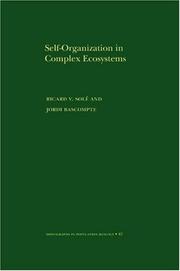| Listing 1 - 10 of 133 | << page >> |
Sort by
|
Periodical
Abstract | Keywords | Export | Availability | Bookmark
 Loading...
Loading...Choose an application
- Reference Manager
- EndNote
- RefWorks (Direct export to RefWorks)
Synergetics --- Life sciences --- Life sciences. --- Synergetics.
Periodical
Abstract | Keywords | Export | Availability | Bookmark
 Loading...
Loading...Choose an application
- Reference Manager
- EndNote
- RefWorks (Direct export to RefWorks)
Synergetics --- Life sciences --- Life sciences. --- Synergetics.
Periodical
Abstract | Keywords | Export | Availability | Bookmark
 Loading...
Loading...Choose an application
- Reference Manager
- EndNote
- RefWorks (Direct export to RefWorks)
Periodical
Abstract | Keywords | Export | Availability | Bookmark
 Loading...
Loading...Choose an application
- Reference Manager
- EndNote
- RefWorks (Direct export to RefWorks)
Synergetics --- Life sciences --- Life sciences. --- Synergetics. --- System theory --- Self-organizing systems --- Biosciences --- Sciences, Life --- Science
Book
ISBN: 3846758965 Year: 2016 Publisher: Paderborn : Wilhelm Fink Verlag,
Abstract | Keywords | Export | Availability | Bookmark
 Loading...
Loading...Choose an application
- Reference Manager
- EndNote
- RefWorks (Direct export to RefWorks)
Synergie ist ein Schlüsselbegriff in Wissenschaft und Gesellschaft. Wie wird er historisch und gegenwärtig verwendet? Was zeichnet ihn als produktives Paradigma in interdisziplinären Forschungs- und Praxisfeldern aus? Als Modell einer holistischen Beschreibung der Wirklichkeit macht die synergetische Perspektive die aristotelische Einsicht fruchtbar, dass das Ganze mehr ist als bloß die Summe seiner Teile. Allgemeine Theorien des Zusammenwirkens (synérgeia) nehmen hier ihren Ausgangspunkt. Mit Blick auf kooperative Interaktionen und dynamische Strukturbildungen in Natur, Kunst und Gesellschaft untersuchen die Beiträge philosophie-, wissenschafts- und kulturgeschichtliche Konstellationen, in denen Synergie-Konzepte besondere Konjunktur haben, und fragen nach dem Zukunftspotenzial dieser transdisziplinären Denkfigur.
Synergetics. --- Synergetics --- System theory. --- Social systems. --- Knowledge, Theory of. --- Social epistemology. --- Science --- Philosophy. --- Social aspects.
Book
ISBN: 9783030956073 Year: 2022 Publisher: Cham Springer International Publishing :Imprint: Springer
Abstract | Keywords | Export | Availability | Bookmark
 Loading...
Loading...Choose an application
- Reference Manager
- EndNote
- RefWorks (Direct export to RefWorks)
Self-organizing systems. --- Synergetics. --- System theory --- Self-organizing systems --- Learning systems (Automatic control) --- Self-optimizing systems --- Cybernetics --- Intellect --- Learning ability --- Synergetics
Book
ISBN: 3030956059 3030956075 Year: 2022 Publisher: Cham, Switzerland : Springer,
Abstract | Keywords | Export | Availability | Bookmark
 Loading...
Loading...Choose an application
- Reference Manager
- EndNote
- RefWorks (Direct export to RefWorks)
Self-organizing systems. --- Synergetics. --- System theory --- Self-organizing systems --- Learning systems (Automatic control) --- Self-optimizing systems --- Cybernetics --- Intellect --- Learning ability --- Synergetics
Book
ISBN: 162618917X 9781626189171 1626188653 9781626188655 Year: 2013 Publisher: New York
Abstract | Keywords | Export | Availability | Bookmark
 Loading...
Loading...Choose an application
- Reference Manager
- EndNote
- RefWorks (Direct export to RefWorks)
Self-organization is a universal mechanism in nature. In the past thirty years, numerous phenomena, theories and methods on self-organization have been founded around the world. This book presents recent achievements in theories and methods of self-organization and includes such theories and methods of self-organization as ant algorithms, particle swarm algorithms, artificial neural networks, motion and migration algorithms, self-adaptive Kalman Filters, finite state approximations, etc. Chapters are contributed by more than 20 scientists from China, Italy, Spain, Japan, Russia, Serbia, India,
Self-organizing systems. --- Learning systems (Automatic control) --- Self-optimizing systems --- Cybernetics --- Intellect --- Learning ability --- Synergetics
Book
ISBN: 178985878X 1789858771 Year: 2021 Publisher: London, England : IntechOpen,
Abstract | Keywords | Export | Availability | Bookmark
 Loading...
Loading...Choose an application
- Reference Manager
- EndNote
- RefWorks (Direct export to RefWorks)
Self-organizing systems. --- Learning systems (Automatic control) --- Self-optimizing systems --- Cybernetics --- Intellect --- Learning ability --- Synergetics

ISBN: 1283380048 9786613380043 140084293X 9781400842933 9780691070391 0691070393 9780691070407 0691070407 9781283380041 Year: 2006 Publisher: Princeton, N.J. : Princeton University Press,
Abstract | Keywords | Export | Availability | Bookmark
 Loading...
Loading...Choose an application
- Reference Manager
- EndNote
- RefWorks (Direct export to RefWorks)
Can physics be an appropriate framework for the understanding of ecological science? Most ecologists would probably agree that there is little relation between the complexity of natural ecosystems and the simplicity of any example derived from Newtonian physics. Though ecologists have long been interested in concepts originally developed by statistical physicists and later applied to explain everything from why stock markets crash to why rivers develop particular branching patterns, applying such concepts to ecosystems has remained a challenge. Self-Organization in Complex Ecosystems is the first book to clearly synthesize what we have learned about the usefulness of tools from statistical physics in ecology. Ricard Solé and Jordi Bascompte provide a comprehensive introduction to complex systems theory, and ask: do universal laws shape the structure of ecosystems, at least at some scales? They offer the most compelling array of theoretical evidence to date of the potential of nonlinear ecological interactions to generate nonrandom, self-organized patterns at all levels. Tackling classic ecological questions--from population dynamics to biodiversity to macroevolution--the book's novel presentation of theories and data shows the power of statistical physics and complexity in ecology. Self-Organization in Complex Ecosystems will be a staple resource for years to come for ecologists interested in complex systems theory as well as mathematicians and physicists interested in ecology.
Self-organizing systems. --- Ecology --- Learning systems (Automatic control) --- Self-optimizing systems --- Cybernetics --- Intellect --- Learning ability --- Synergetics --- Mathematical models. --- Population biology.
| Listing 1 - 10 of 133 | << page >> |
Sort by
|

 Search
Search Feedback
Feedback About UniCat
About UniCat  Help
Help News
News